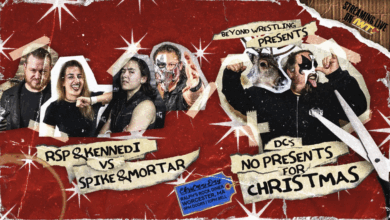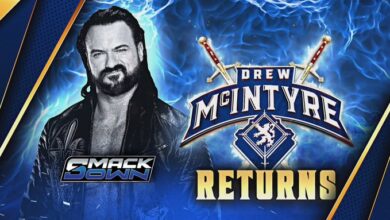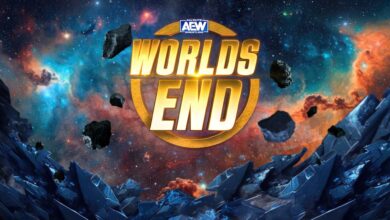Jimmy Van: Promotion Haters Don’t See The Big Picture

I grew up in the 1980s in Ontario, Canada, in a small town with no cable television (there is still none to this day) and only a couple of channels that we could catch with an antenna. But one of those channels aired WWE’s Superstars of Wrestling syndicated show weekly and so I became a lifelong WWE fan. I became familiar with other promotions through the magazines – this was long before the Internet of course – but WWE is what was near and dear to my heart because that is all I could watch and so that is all I knew.
My family finally got a satellite dish in the early 90s and so I was able to start watching programming from other promotions including the AWA and WCW, but WWE still remained my favorite. And in the mid-to-late 90s when Eric Bischoff launched Monday Nitro and changed the business by booking quality matches every week and creating the nWo, I missed the majority of it because on Monday nights I chose to watch Raw instead. Ditto for ECW programming which I also was able to catch via satellite. I didn’t hate WCW or ECW; my allegiance just happened to lie with WWE.
By 2001 I was running my old wrestling site JimmyVan.com full-time and so it was in my best interest to cover all of wrestling, and I did. I still probably showed preferential treatment to WWE, but I covered it all. Eventually ECW and WCW both went out of business and were swallowed up by WWE, and I couldn’t help but notice that a lot of my pro-WWE readers rejoiced at that news. “F*ck WCW,” some of them would say. For me at the time, I was mainly concerned about whether the loss of those companies would mean that their fans would shift over to WWE programming (most didn’t), or would disappear entirely since that would impact my bottom line. Ultimately it didn’t matter since my advertising revenue was cut by 90% due to the dot-com bubble burst and eventually I had to join the regular working world and let the site go.
I remained a fan. I followed WWE, and while TNA didn’t interest me and I usually didn’t watch it, I at least kept tabs on the goings-on with that company as several performers from my indy days in Canada had landed jobs with TNA. I also kept tabs on the U.S. independent scene and even somewhat on the Japanese and Mexican scenes but for the most part only watched WWE and also became a big UFC fan. Still, I didn’t hate those other promotions and certainly didn’t want to see hell unleashed upon them.
Today I own the brand spanking new Fightful.com website and while I leave the day-to-day operations of the site up to the one and only Sean Ross Sapp, I do keep tabs on what our readers say and to what is generally said about any big topic in wrestling, MMA or boxing not just on this site but on social media in general. And I’m somewhat surprised to still see a lot of people that want to see a company like WWE or TNA crash and burn and rejoice whenever Raw’s rating or Impact’s rating reaches a new low. And while I understand that social media is a haven for miserable people who hate their lives and who want to rip on everyone else and try to bring them down to their level, I think that if you’re a wrestling fan and wish harm on WWE or any other promotion, you’re not seeing the big picture.
First and foremost, if a company like WWE or TNA were to close their doors, it would mean that a lot of people would be out of a job. On WCW’s last night before the WWE takeover in 2001, a lot of WCW personnel had those concerns and rightfully so since many weren’t picked up by WWE and really had nowhere else to go and so they were left unemployed with bills to pay and families to look after. Wrestlers, writers, cameramen – they’re all people too, trying to make a living just like you and me. And just as wrestlers would have limited employment options with less companies in existence, they also would have limited negotiating leverage. I mean it’s hard to ask for a raise and threaten to leave and go somewhere else if you may have nowhere else to go.
Secondly – and we saw this during the famed Monday Night Wars era – competition makes wrestling better. Vince McMahon and WWE were in a rut in the early 90s until WCW started whipping their asses in the ratings and it lit a fire under McMahon and forced him to change his product and get with the times in order to compete. When WWE conquered WCW and ECW, McMahon took his foot off the gas so to speak. There was no great sense of urgency anymore and what followed were years and years of horrible creative and an inability to make new stars. Then TNA started to create a buzz with the signing of Hulk Hogan, and their Impact viewership got as high as 2.2 million viewers in 2010, leading to optimism that maybe if TNA could become a viable alternative to WWE, it would give McMahon the shot in the arm he needed to right the ship. Unfortunately TNA was led by Dixie Carter who just wasn’t cut out to be a wrestling executive, and so TNA never got to the level of WWE and in fact, went backwards.
Furthermore, Wrestlemania week has become the most important week of the year in terms of business for most major U.S. independent wrestling companies. Every year now, the major U.S. indy feds book shows during Wrestlemania week in whatever city WWE is promoting Mania in because they know that that town will have tens of thousands of wrestling fans who have flown in for the big event and so the indy companies can draw a full house with minimal difficulty. If you take away WWE and take away Wrestlemania week, you are eliminating the biggest financial week of the year for most of those independent promotions at the same time.
There has been a bit of a mentality shift with respect to WWE talent. It used to be that WWE was the goal of every pro wrestler, and the only place for them to make any real money. But now we’ve actually seen talent voluntarily leave the company such as CM Punk, Alberto Del Rio, Ryback and Cody Rhodes, and make a living for themselves on the independent wrestling circuit or in the case of Punk, in the MMA world. Sure they’re likely not making as much as they did in WWE but they also don’t have as hectic a schedule, plus their trans and hotels are paid for by the companies they work for and not by themselves, meaning it’s worth it to them. But have you ever noticed that no matter how frustrated these ex-WWE talents were with creative or with a lack of push, the majority of them won’t bad-mouth Vince McMahon or WWE personally (CM Punk being an obvious exception)? Sure they’ll do interviews and they’ll express their frustrations just like any employee from any company, but they won’t trash talk WWE. The reason? They understand that they made their name in WWE, that they’re able to make a living on the independent scene because of their WWE exposure, and they want to ensure that they burn no bridges and that the door is open to a potential return down the road.
So for those of you reading this who have a hate-on for WWE, for TNA, for UFC for that matter, or for any other promotion, try to think about the big picture. Try to think about what would happen if the company you hate really did go out of business. Think about those who would lose their jobs, or the ripple effect that would impact other promotions. If you don’t like a company’s product, just don’t watch it, plain and simple.




